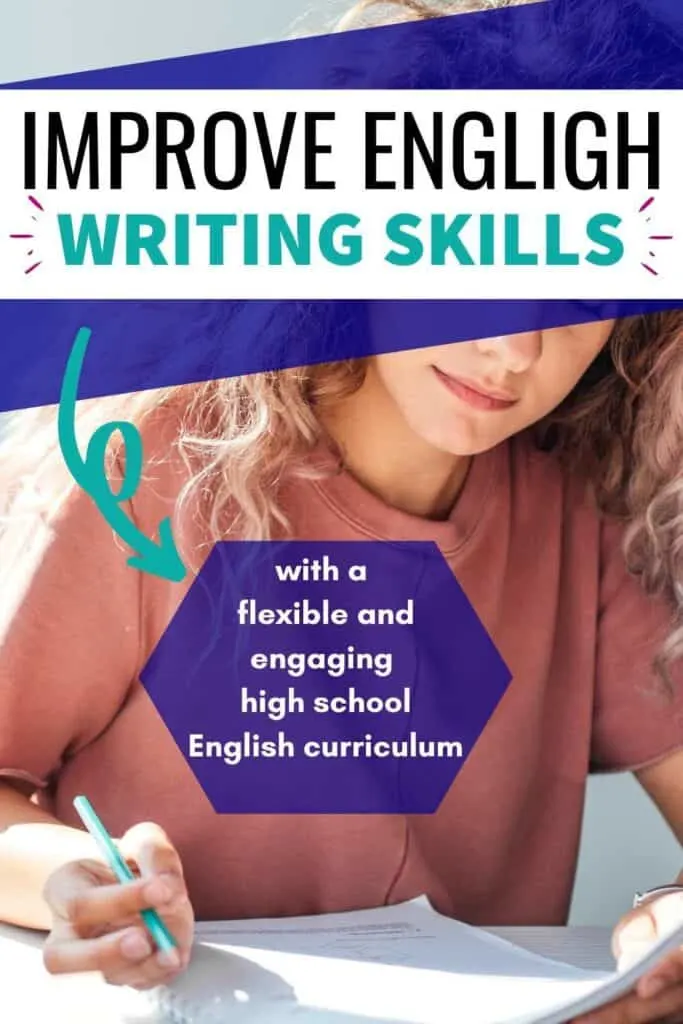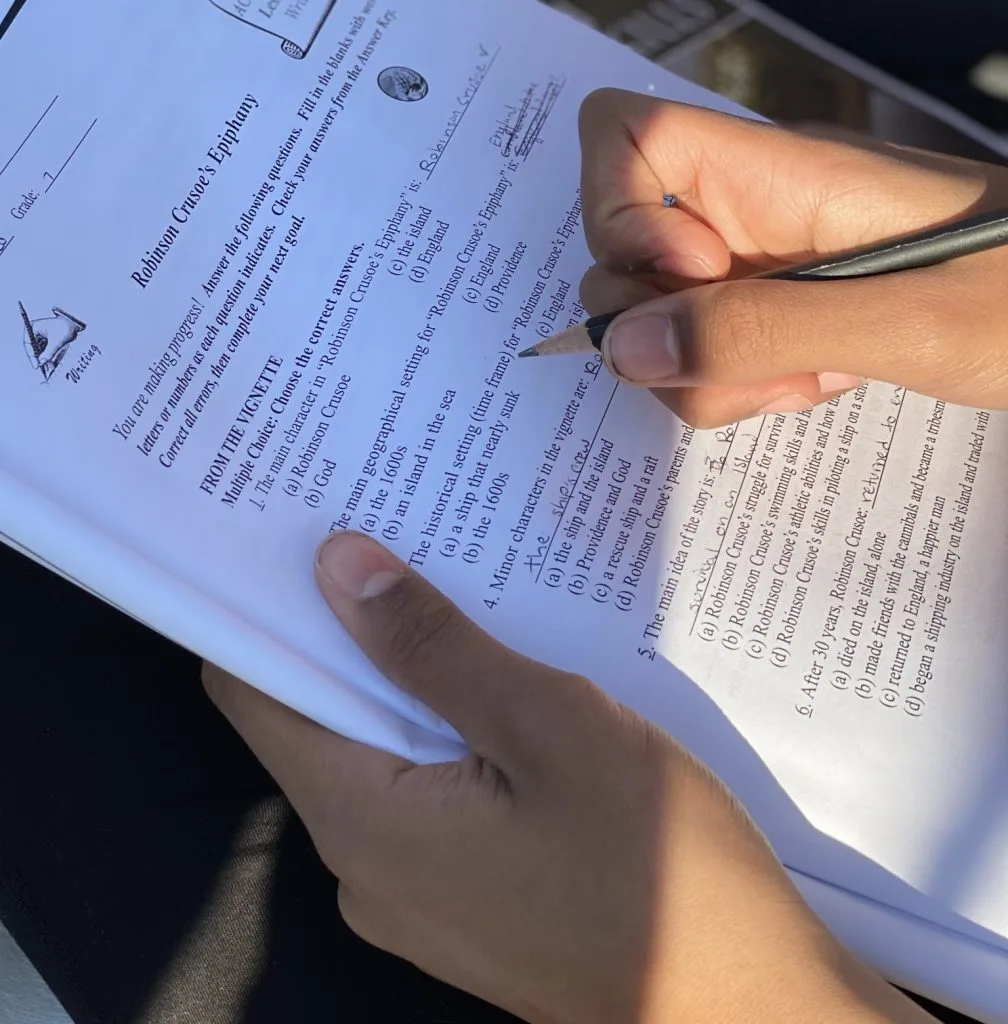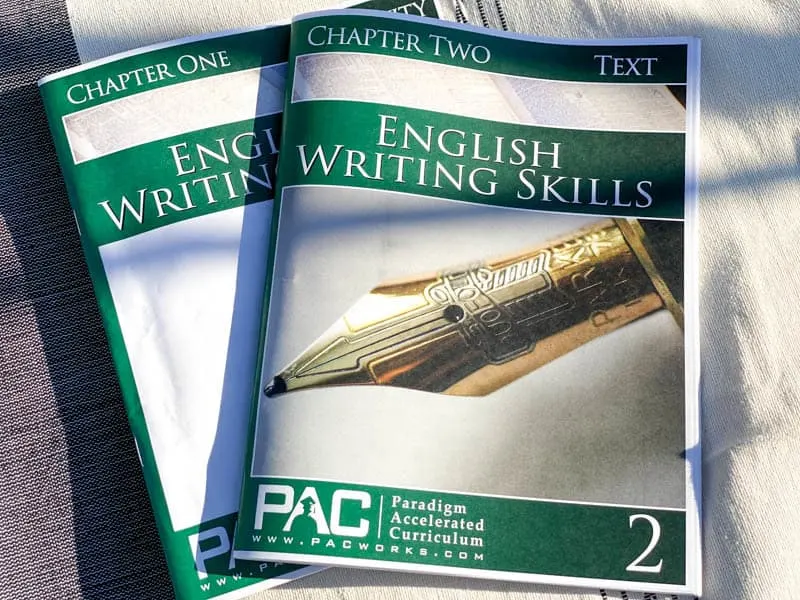Once homeschoolers hit high school, they need curriculum options with as much flexibility as possible. Their busy schedules often include part-time jobs, volunteer commitments, and extracurricular activities and their classes need to work within those constraints. The four-year high school English curriculum created by Paradigm Accelerated Curriculum is designed to fit this need while ensuring students master English writing skills before heading to college.

I received a free copy of Paradigm Accelerated Curriculum’s English Writing Skills course for review purposes and I was compensated for my time. All opinions are my own and I am not required to post a positive review.
A Homeschool English Curriculum that Adapts to Our Unique Needs
So, apparently my two middle-school-aged daughters have decided they want to complete high school early. I’m not entirely clear on their rationale; perhaps they think finishing early will put them closer to launching their chosen career track sooner. (Their current goal is to write screenplays for Disney).
Or maybe they just think getting the work out of the way now means they’ll have more time to rest later.
As their mom, I’m torn between desperately wanting them to slow down and enjoy their childhood and brushing their goal off without much further thought.
These are, after all, the same kids who figure they can probably be on Broadway within a couple of years. I’m not saying that either of these things couldn’t happen—and I certainly wouldn’t say that to them—but suffice it to say they have many aspirations but not so many plans.
Yet.
See, it’s probably not entirely out of their reach to finish high school ahead of schedule if they really want to. Their dad graduated at sixteen and I finished college a year early. I guess impatience runs in their blood.

I’m open to making a plan but it will be up to them to motivate themselves through it if this is something that’s really important to them.
The first step of such a plan will involve sorting through and making sense of all the graduation requirements.
The second step will be choosing the curriculum that’s going to get them through and keep them motivated for the long haul.
Paradigm Accelerated Curriculum’s English language classes are a great option for students who want to work at their own pace, whether that’s lightning speed or a leisurely stroll.
Why Students Need Flexible High School English Classes
Of course, it’s not just eager beaver students who need flexibility with their courses. There are many reasons why high school students need flexible programs.
Here are some reasons why flexibility is important when choosing high school English courses:
- In general, students learn best when they can move at their own pace. Rushing through a program just to meet state standards or mandatory learning goals is unhelpful, but so is forcing them to move slowly through a course at a speed that leaves them uninspired and dampens their love of learning.
- Other students need the flexibility to access their language arts courses both online and offline. They may prefer to do to the reading on the computer but the activities in a workbook. Or they may want to have access to both print and digital versions of their program so they can use one at home and another while riding in the car, for example.
- Parents, particularly those teaching students at multiple grade levels, may need the flexibility of a program that students can complete mostly independently while still allowing the parent/teacher to be involved with answering questions, administering quizzes and tests, and marking student assignments using rubrics.
The Four Levels of PAC’s Continuous High School English Program
PAC’s four-year high school English curriculum—which can be completed as slowly or as quickly as needed—unfolds as follows:
- English I: Language Skills—Language Skills, designed with 9th-grade students in mind, reviews the eight parts of speech and their application. Students conduct literary analysis on short works carefully selected to equip them to craft strong sentences and paragraphs. They improve their writing skills by writing poems, letters, essays, narratives, editorials, articles, speeches, allegories, and research papers.
- English II: Composition Skills—Level II, aimed at 10th-grade students, teaches them to write pieces that inform, entertain, persuade and challenge. Students learn to address literary concepts such as cause and effect, logic, premises, comparison, and contrasts. During the learning process, students enhance vocabulary, build moral character, and gain insight on how to make wise life choices.
- English III: Writing Skills—At this stage, designed for 11th grade, students continue to hone their writing skills. In addition to producing poems, letters, essays, narratives, editorials, articles, speeches, allegories, they delve more deeply into the development and production of a research paper: draft, outline, bibliography, references, transitions, and more.
- English IV: Literature and Philosophy—The final level, ideal for 12 grade, takes a historical approach to literature, touching on ancient writings and progressing through the Dark Ages, the Medieval Era, and into Modern times. This course also serves as an introduction to philosophy, because it consists of selections that equip students with perspectives on theology, economics, social activists, and historical thinkers who encouraged freedom and virtue, and authors who express philosophies which inhibit freedom and virtue. This course provides a study of the major world authors who were “firsts” in their fields of philosophy, reform, politics, science, religion, drama, poetry, novels, short stories, essays, biographies, and autobiographies.
Each level follows a similar format. The remainder of this review focuses on English III: Writing Skills.
Format and Content of the English III Language Arts Course
Each high school English curriculum offered by PAC can be purchased as a digital and/or paper product.
The English Writing Skills course comes with five magazine-style textbooks and five workbooks. Each chapter of the program has its own text and workbook, making it a light and highly portable curriculum.
You can purchase the texts and activity books individually, or you can buy the entire set along with an indispensable Teacher’s Resource Kit. The course is designed for use in classrooms or as self-study units.
Each chapter has fifteen lessons grouped into three sets of five. The lessons are short
Students read one lesson and then respond to correlated questions in their activity books. At the end of every five lessons, students take a quiz. After each chapter, students write a chapter test.
The Teacher Resource Kit contains answers to all of the activities, quizzes, and tests.
These are some of the topics covered in each chapter:
Chapter 1
- Writing vignettes
- Creative writing: Writing myths, legends, fables, and parables
- Writing historical fiction
- Journal writing
- Personal records
- Social correspondence
- Informal letters
- Technical and business writing, resumes
Chapter 2
- Critical thinking
- Analogies
- The process of elimination
- Anagrams
- Codes
- Symbols in American culture
- Advertisements
- Cause and Effects
- Premise
- Propaganda
- Rhetoric
- Literary techniques
Chapter 3
- Critical thinking
- Inductive reasoning
- Deductive reasoning
- Conditional statements
- Corollary statements

Chapter 4
- Writing Skills
- Focus and organization
- Development of ideas
- Developing sentences and paragraphs
- Introduction, body, conclusion
- Voice
- Conventions of English grammar
- Proofreading and correcting
Chapter 5
- Developing a research paper
- Approaching your topic
- Fact-finding and planning
- Research
- Outlining
- Documentation
- Standardized Tests
- Reading Comprehension
English III: Writing Skills Offers Maximum Flexibility for Students
What our family appreciated about the English Writing Skills course is that it is entirely self-paced. There is no pressure or expectation that students will finish in a certain timeframe.
The covers of the texts and activity books do not indicate a particular grade, so a student can jump in at whatever level they’re ready for and work through the program slower than or faster than the suggested four years.
The books are also light enough that students can easily slip them in their backpack to work on in the car or anywhere they find themselves waiting for a few minutes.
While our family prefers to use the paper version of the program, the digital version is also handy to have. It can be accessed from any device at any time or place. This is helpful if the student finds herself with some free time and hasn’t doesn’t have her books on hand.
Also, because each of the chapters can be purchased individually, parents/teachers have the option to select only the segments of the curriculum that they want to use in their classroom/home.
English Writing Skills Course Pricing
- Individual chapter texts are priced at $8.95
- Individual activity books are priced at $6.45
- The full course kit is $80.55 for the print version and $33.69 for the digital version

Sophie Agbonkhese is a writer, homeschooling mother of four, and a recovering overachiever (who occasionally relapses). She is the founder of My Cup Runs Over, a site dedicated to helping busy women simplify and enrich their lives. When she’s not writing or debugging websites, Sophie spends her time reading, dancing, bullet journaling, reading, gardening, listening to audiobooks, and striving fruitlessly to have a clean house for at least five minutes.



